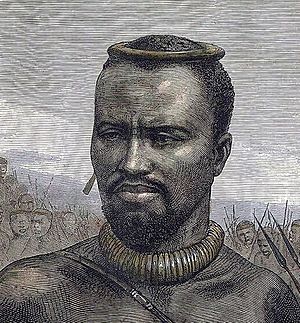Dabulamanzi kaMpande facts for kids
Quick facts for kids
Dabulamanzi kaMpande
|
|
|---|---|

A picture of Dabulamanzi from the Illustrated London News
|
|
| Born | 1839 |
| Died | September 22, 1886 (aged 46–47) |
| Allegiance | Zulu Kingdom |
| Rank | Commander of the Undi corps |
| Battles/wars | Anglo-Zulu War
|
| Children | Prince Bangani KaDabulamanzi |
Dabulamanzi kaMpande (born 1839 – died September 22, 1886) was an important Zulu leader and commander. He served the Zulu Kingdom during the Anglo-Zulu War. He is best known for leading Zulu forces at the Battle of Rorke's Drift. Dabulamanzi was also the half-brother of Cetshwayo kaMpande, who was the Zulu king.
After the Zulus lost the war and King Cetshwayo was removed from power, Dabulamanzi worked hard to get his brother back on the throne. When Cetshwayo became king again in 1883, Dabulamanzi continued to fight for the unity of the Zulu kingdom. His name, Dabulamanzi, means 'the one who conquers the waters'.
Contents
Early Life and Family
Dabulamanzi's father was Mpande, a previous Zulu King. This made Dabulamanzi a half-nephew of the famous Zulu leader Shaka. He was also the younger half-brother of King Cetshwayo kaMpande. His mother was Sanguza, one of King Mpande's many wives. Dabulamanzi had a son named Prince Bangani KaDabulamanzi. Prince Bangani's son was Prince Joseph Gabriel Lamthuthu.
Role in the Anglo-Zulu War
Dabulamanzi played a part in the Battle of Isandlwana. He led the Undi Corps reserves, which were backup troops. However, his forces did not see much fighting during that battle.
Battle of Rorke's Drift
After Isandlwana, Dabulamanzi took the reserve forces to lead the Zulus at the Battle of Rorke's Drift. He did this even though his older brother, King Cetshwayo, had told him not to attack the British outside of Zulu lands. Dabulamanzi's fighting plans at Rorke's Drift were not successful. This allowed a small group of British soldiers to defend their position against the Zulu attack.
Siege of Eshowe and Gingindlovu
Later, Dabulamanzi helped organize the Siege of Eshowe. He worked with Mavumengwana kaNdlela Ntuli to block off Fort Eshowe. This trapped British troops led by Charles Pearson for two months. When Lord Chelmsford arrived with more British soldiers to help, Dabulamanzi led the right side of the Zulu army. This happened at the Battle of Gingindlovu, where the Zulus were defeated.
After the War
After the Anglo-Zulu War, Dabulamanzi became a key figure who opposed British control. He strongly spoke out against Theophilus Shepstone and John Robert Dunn. Dunn was a former advisor to King Cetshwayo who had sided with the British. He gained a lot of land after the British won the war. Dabulamanzi was very determined to see his brother, Cetshwayo, return as king of Zululand.
Continuing Conflicts
There were many disagreements and fights between different Zulu groups. Because of this, the British decided to bring Cetshwayo back as king. They hoped this would bring peace, but the fighting continued. Dabulamanzi then led the fight against Cetshwayo's main enemy, Zibhebhu kaMaphitha. Zibhebhu was supported by Boer mercenaries, who were soldiers paid to fight.
In 1883, Dabulamanzi was defeated by Zibhebhu in the Battle of Msebe and at oNdini. After King Cetshwayo died, Dabulamanzi supported the king's son, Dinuzulu. In 1884, he helped Dinuzulu make an agreement with Boer mercenaries. However, these mercenaries demanded a lot of land, which led to more conflicts. On September 22, 1886, Dabulamanzi was shot and killed during a fight with a group of Boers.
 | Ernest Everett Just |
 | Mary Jackson |
 | Emmett Chappelle |
 | Marie Maynard Daly |

